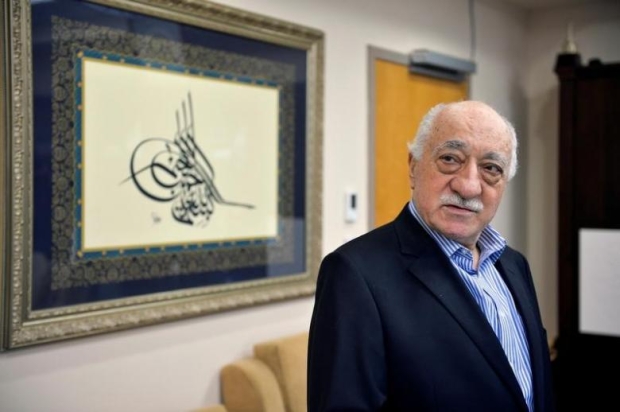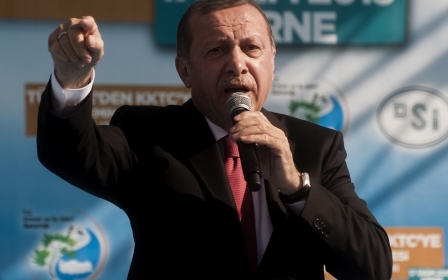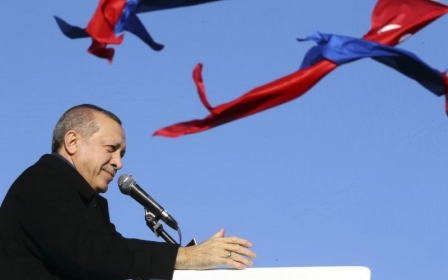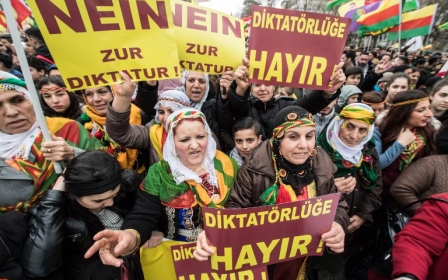Turkey summons German envoy over 'pro-PKK rally scandal'
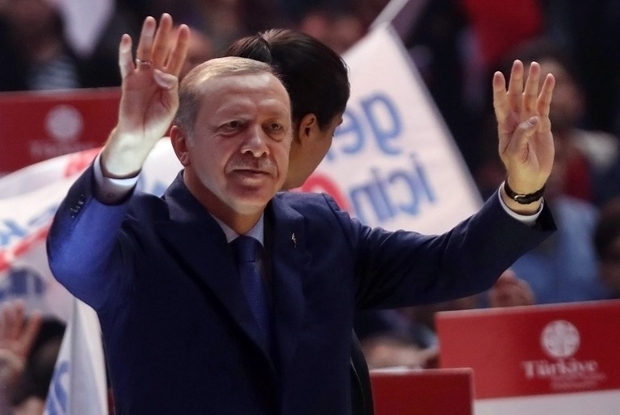
Turkey has summoned Germany's ambassador to express its anger at a Frankfurt rally where protesters brandished insignia of outlawed Kurdish militants, the presidential spokesman said Sunday
Some 30,000 pro-Kurdish protesters attended Saturday's rally where demonstrators called for a "No" vote in a 16 April referendum on expanding Turkish President Recep Tayyip Erdogan's powers.
'Yesterday, Germany put its name under another scandal'
- Ibrahim Kalin, presidential spokesman
Many carried symbols of the outlawed Kurdistan Workers' Party (PKK), which has been fighting an insurgency against the Turkish state for more than three decades.
"Yesterday [Saturday], Germany put its name under another scandal," presidential spokesman Ibrahim Kalin told CNN-Turk, complaining about the open use of insignia of the "separatist terror group" the PKK.
"Yesterday, the German ambassador was invited - was summoned - to the foreign ministry and this was condemned in the strongest way."
He said the demonstrators had used the upcoming Kurdish New Year festival of Newroz as a "pretext" for the rally as the new year falls on Tuesday.
Ankara accuses Berlin of hypocrisy
The foreign ministry on Saturday accused the German authorities of blatant hypocrisy for allowing the protest despite preventing Turkish ministers from campaigning there for a referendum "Yes" vote.
Turkish officials noted that the protesters had waved banners of a group that is itself illegal in Germany. The ministry said that allowing the rally to go ahead was the "worst example of double standards".
Many protesters carried portraits of jailed PKK leader Abdullah Ocalan, who is serving a life sentence in Turkey, calling for his release.
READ: Why some European states have declared war against Turkish ally
Tens of thousands of people have been killed since the PKK launched its insurgency against the Turkish state in 1984, initially seeking independence for Kurds in the southeast and then for greater autonomy and rights.
The group is listed as a terror organisation not just by Turkey but also by the European Union and the United States.
The ban this month on Turkish officials campaigning in various European states has triggered a crisis in Ankara's relations with the EU.
Erdogan has accused Germany and the Netherlands of behaviour reminiscent of Nazi Germany, while Berlin has in turn expressed revulsion at his comments.
Meanwhile, Turkey also accused Germany of supporting the network of a US-based Muslim cleric it blames for last year's attempted coup, comments likely to aggravate a diplomatic feud between Ankara and Berlin.
On Saturday, German news magazine Der Spiegel published an interview with the head of Germany's BND foreign intelligence agency, who said Ankara had failed to convince it that the cleric Fethullah Gulen was responsible for the coup attempt.
"Turkey has tried to convince us of that at every level, but so far it has not succeeded," Bruno Kahl was quoted as saying.
President Tayyip Erdogan's spokesman said Kahl's comments were proof Germany was supporting Gulen's network, which Ankara refers to as the "Gulenist Terrorist Organisation" or "FETO".
"It's an effort to invalidate all the information we have given them on FETO. It's a sign of their support for FETO," Kalin told broadcaster CNN Turk on Sunday.
"Why are they protecting them? Because these are useful instruments for Germany to use against Turkey."
Germany and Turkey have been locked in a deepening row after Berlin banned some Turkish ministers from speaking to rallies of expatriate Turks ahead of the referendum next month, citing public safety concerns.
Kalin said there was a possibility Erdogan could plan a rally to address Turks in Germany before the referendum on changing the constitution, a move that would further heighten tensions with Berlin.
Critics say the constitutional change would give Erdogan too much power.
The Turkish government blames Gulen's network of followers in the military for the abortive putsch last July, when a group of rogue soldiers seized tanks, helicopters and war planes to attack parliament and attempt to overthrow the government. More than 240 people died in the attempt.Gulen, a former Erdogan ally who has lived in self-imposed exile in the US since 1999, has denied the charges and condemned the coup.
Middle East Eye propose une couverture et une analyse indépendantes et incomparables du Moyen-Orient, de l’Afrique du Nord et d’autres régions du monde. Pour en savoir plus sur la reprise de ce contenu et les frais qui s’appliquent, veuillez remplir ce formulaire [en anglais]. Pour en savoir plus sur MEE, cliquez ici [en anglais].


